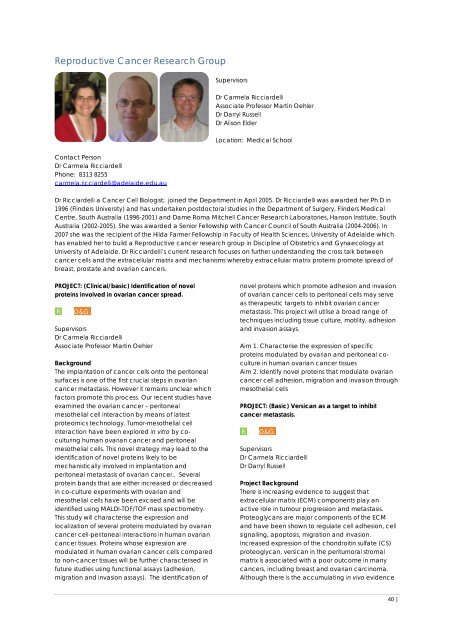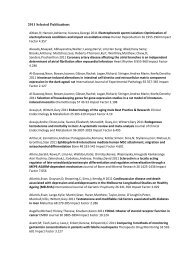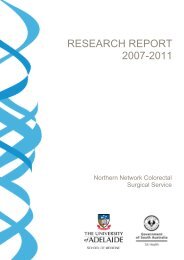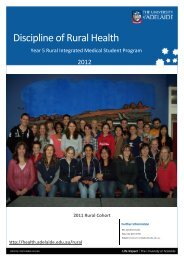Honours Project Book - Faculty of Health Sciences - University of ...
Honours Project Book - Faculty of Health Sciences - University of ...
Honours Project Book - Faculty of Health Sciences - University of ...
You also want an ePaper? Increase the reach of your titles
YUMPU automatically turns print PDFs into web optimized ePapers that Google loves.
Reproductive Cancer Research Group<br />
Contact Person<br />
Dr Carmela Ricciardelli<br />
Phone: 8313 8255<br />
carmela.ricciardelli@adelaide.edu.au<br />
Supervisors<br />
Dr Carmela Ricciardelli<br />
Associate Pr<strong>of</strong>essor Martin Oehler<br />
Dr Darryl Russell<br />
Dr Alison Elder<br />
Location: Medical School<br />
Dr Ricciardelli a Cancer Cell Biologist; joined the Department in April 2005. Dr Ricciardelli was awarded her Ph D in<br />
1996 (Flinders <strong>University</strong>) and has undertaken postdoctoral studies in the Department <strong>of</strong> Surgery, Flinders Medical<br />
Centre, South Australia (1996-2001) and Dame Roma Mitchell Cancer Research Laboratories, Hanson Institute, South<br />
Australia (2002-2005). She was awarded a Senior Fellowship with Cancer Council <strong>of</strong> South Australia (2004-2006). In<br />
2007 she was the recipient <strong>of</strong> the Hilda Farmer Fellowship in <strong>Faculty</strong> <strong>of</strong> <strong>Health</strong> <strong>Sciences</strong>, <strong>University</strong> <strong>of</strong> Adelaide which<br />
has enabled her to build a Reproductive cancer research group in Discipline <strong>of</strong> Obstetrics and Gynaecology at<br />
<strong>University</strong> <strong>of</strong> Adelaide. Dr Ricciardelli’s current research focuses on further understanding the cross talk between<br />
cancer cells and the extracellular matrix and mechanisms whereby extracellular matrix proteins promote spread <strong>of</strong><br />
breast, prostate and ovarian cancers.<br />
PROJECT: (Clinical/basic) Identification <strong>of</strong> novel<br />
proteins involved in ovarian cancer spread.<br />
.R. O&G.<br />
Supervisors<br />
Dr Carmela Ricciardelli<br />
Associate Pr<strong>of</strong>essor Martin Oehler<br />
Background<br />
The implantation <strong>of</strong> cancer cells onto the peritoneal<br />
surfaces is one <strong>of</strong> the first crucial steps in ovarian<br />
cancer metastasis. However it remains unclear which<br />
factors promote this process. Our recent studies have<br />
examined the ovarian cancer – peritoneal<br />
mesothelial cell interaction by means <strong>of</strong> latest<br />
proteomics technology. Tumor-mesothelial cell<br />
interaction have been explored in vitro by coculturing<br />
human ovarian cancer and peritoneal<br />
mesothelial cells. This novel strategy may lead to the<br />
identification <strong>of</strong> novel proteins likely to be<br />
mechanistically involved in implantation and<br />
peritoneal metastasis <strong>of</strong> ovarian cancer.. Several<br />
protein bands that are either increased or decreased<br />
in co-culture experiments with ovarian and<br />
mesothelial cells have been excised and will be<br />
identified using MALDI-TOF/TOF mass spectrometry.<br />
This study will characterise the expression and<br />
localization <strong>of</strong> several proteins modulated by ovarian<br />
cancer cell-peritoneal interactions in human ovarian<br />
cancer tissues. Proteins whose expression are<br />
modulated in human ovarian cancer cells compared<br />
to non-cancer tissues will be further characterised in<br />
future studies using functional assays (adhesion,<br />
migration and invasion assays). The identification <strong>of</strong><br />
novel proteins which promote adhesion and invasion<br />
<strong>of</strong> ovarian cancer cells to peritoneal cells may serve<br />
as therapeutic targets to inhibit ovarian cancer<br />
metastasis. This project will utilise a broad range <strong>of</strong><br />
techniques including tissue culture, motility, adhesion<br />
and invasion assays.<br />
Aim 1. Characterise the expression <strong>of</strong> specific<br />
proteins modulated by ovarian and peritoneal coculture<br />
in human ovarian cancer tissues<br />
Aim 2. Identify novel proteins that modulate ovarian<br />
cancer cell adhesion, migration and invasion through<br />
mesothelial cells<br />
PROJECT: (Basic) Versican as a target to inhibit<br />
cancer metastasis.<br />
.R. O&G.<br />
Supervisors<br />
Dr Carmela Ricciardelli<br />
Dr Darryl Russell<br />
<strong>Project</strong> Background<br />
There is increasing evidence to suggest that<br />
extracellular matrix (ECM) components play an<br />
active role in tumour progression and metastasis.<br />
Proteoglycans are major components <strong>of</strong> the ECM<br />
and have been shown to regulate cell adhesion, cell<br />
signalling, apoptosis, migration and invasion.<br />
Increased expression <strong>of</strong> the chondroitin sulfate (CS)<br />
proteoglycan, versican in the peritumoral stromal<br />
matrix is associated with a poor outcome in many<br />
cancers, including breast and ovarian carcinoma.<br />
Although there is the accumulating in vivo evidence<br />
40 |





